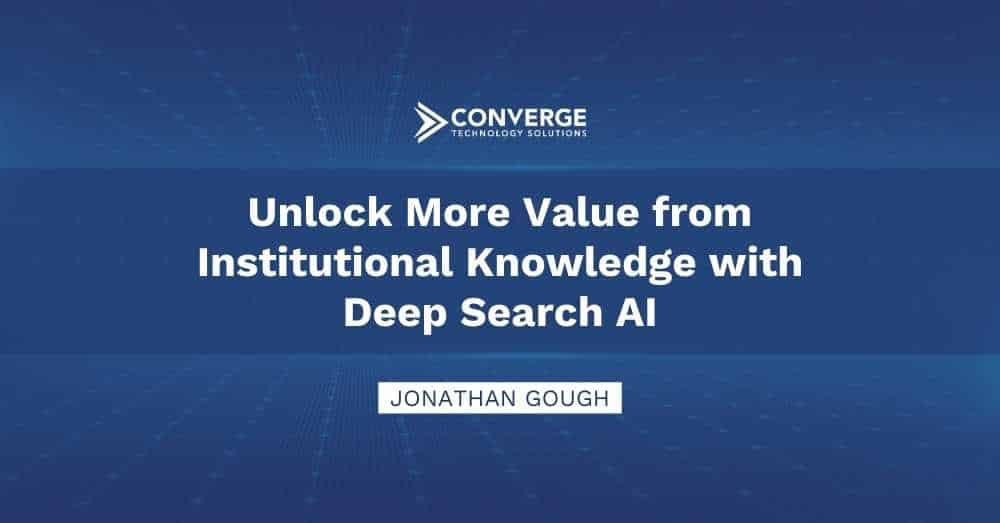Every enterprise has a wealth of institutional knowledge about their customers, operations, and business model. A lot of this valuable information is stored in a variety of formats, such as PDFs, images, diagrams, and videos. In the digital sense, these documents represent a large amount of unstructured data.
Using this information to make business decisions and create value often involves a substantial manual effort. Company employees need to read, make sense of, and organize this information in a way that is useful to the organization. In some cases, this effort is expensive and time consuming, and in others, it is prohibitive due to the vast number of documents to review.
These documents usually have a wealth of information within them, but one of the challenges often faced by enterprises is “how do we get to it?” An excellent approach is using AI-powered deep search.This approach ingests, digitizes, explores, learns, and parses the contents of these documents. The AI learns the context of information from every single sentence of every document and learns the organization’s unique institutional jargon and acronyms.
By doing this, AI is then able to accurately derive meaning from the contents of the documents, organize them, and store them in a way that can be served up to the organization in useful ways, such as through intuitive search or reporting. Where there were once unstructured piles of information, there is now searchable, meaningful content that can be surfaced to the organization with simple natural language queries.
AI in action: Enhancing knowledge extraction for an International Bank
This international development bank, a lender to governments around the world, had a large number of documents, which contained a vast amount of institutional knowledge. These documents contained complex tables, charts, and images that detailed what might happen if the bank took a particular course of action, such as taking on an economic transformation program or a financial support project in a particular country that the bank serves.
Making this unstructured data tactile and accessible in a quick and easy manner was a significant challenge. To get useful information from and understand the contents of these documents, the organization’s employees would need to read, understand, and cut/paste information from them. The bank reached out to Converge to see what AI could do with this repository of documents.
Converge downloaded these 15K documents (approximately) which contained 63M words. Then Converge used optical character recognition (OCR) to read them in as PDFs and used AI models to identify the critical portions, the common and important structural pieces —finding different hierarchical levels and different buckets which organized the information. Converge used AI to parse the information into a structured data set to make the information easily accessible to the organization.
An important component of making the information accessible was where traditional PDF extraction falls short. Many organizations have their own language, such as acronyms, phrases, and institutional jargon in documents that change over time. Converge solved this challenge using deep document search.
Converge ingested all the unstructured data and built models to learn the language of the institution itself and then used it to identify the information that people within the institution are interested in. The solution leveraged sentence level embeddings which meant that the AI could understand and identify, in context, every sentence in every paragraph in every document that it ingested. This unlocked a wealth of information that previously would have required substantial manual effort.
The proof of concept was up and running in a matter of days. And due to the success of the engagement, Converge and the Bank are exploring a number of other areas of the business where this kind of AI can further make an impact.
Working with Converge: AI at speed and value
Through a tightly scoped proof of concept, Converge makes deep search AI technology available to clients in a way that is cost effective and provides quick value. After proving the value of AI, Converge helps enterprises expand the vision and extend the technology to make an impact in other areas of the business. Converge’s deep search process involves:
- Intelligent document ingestion: Ingest unstructured data from a variety of internal and external sources using web crawlers, connectors, and REST API.
- Deep learning, context-aware enrichment: Apply text analytics solutions to make data easier to retrieve, analyze, and apply within your business context.
- Real-time, optimized storage: Organize and store enriched data, making information readily accessible for real-time search and analytics.
- Personalized search experiences: Surface information through an enterprise search user interface and generate insights using content analytics.
Start exploring deep search
Unlock more value from your documented institutional knowledge. With the right approach, you may uncover possibilities with your data that you hadn’t even considered. With end-to-end support, Converge’s AI team is ready to explore your biggest information challenges and opportunities to see what AI can bring to your business. Let’s see what you can achieve with AI.





